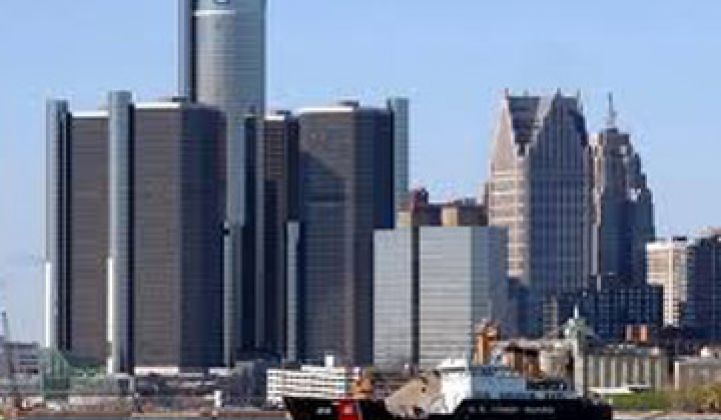ABB, the Swedish-Swiss electrical equipment giant, continued its shopping and investing spree across America this morning by announcing it would invest $10 million in Ecotality, the startup that wants to build a car charging network.
The deal comes as the North American International Auto Show gets underway in Detroit.
The investment nicely dovetails with the agendas of both companies. ABB is beefing up its portfolio as part of its effort to rival General Electric, Siemens and Schneider Electric in the infrastructure market. (Collectively, they are the four horsemen of the smart grid.)
The company has shown a particular interest in the U.S. Last year, it bought Baldor Electric (efficient motors) for $4.2 billion, virtual power plant developer Ventryx for $1 billion, and Insert Key Solutions, which specializes in asset management software. ABB also invested in Power Assure, which makes software for managing applications in datacenters to save money. Ecotality is the fifth deal.
It's well timed, too. Car charging in 2008 and 2009 was mostly dominated by startups like Better Place, Coulomb Technologies and Ecotality. Last year, General Electric and Schneider entered the market. Considering the high costs and regulatory issues, this market will likely become dominated by the established giants. Expect a massive consolidation. The Ecotality investment gives that company some breathing room.
Ecotality is also cognizant of some of the coming challenges. We recently sat down with CEO Jonathan Read. He mentioned how subscription services may cost only $10 a month (versus the $40 or $50 some touted earlier) and how charging stations could even be free with multi-year service contracts.
“This is a battle for turf. It is a battle for network coverage,” he told us last month. “We’re going to have six or seven robust companies out of the box.”
It is an interesting take. Check out the interview.
Elsewhere in Detroit:
--Earlier in the year, we noted that Tesla Motors was only selling around 10 cars a week (9.7 to be exact). Sales have improved.
Now the company is selling close to 11 cars a week. Tesla today said it has shipped over 1500 Tesla Roadsters. At the end of 2009, the company had shipped 937 cars. That means around 563 got shipped in 2010, according to a three-digit subtraction analysis by Greentech Media. 563 divided by 52 comes to 10.83. Put another way, that's two cars a week. 126 of those cars were shipped in the first quarter.
Last year Tesla expanded the sales push into Asia and Europe. The Roadster costs over $100,000. Sales will increase with the Model S coming in 2012, which will sell for around half the price and contain enough space for five adults.
--Porsche unveiled the 918 RSR, a hybrid version of its sporty Spyder. Porsche is now part of the House of Volkswagen, which also includes Audi. Both Audi and Volks have announced electric cars and plan to bring more clean diesels to the U.S.
--Last week, Ford showed off the all-electric Focus for 2011. The car will charge in three to four hours, far less than the Nissan Leaf, because of a high-powered charger. Ford also announced it would add 7,000 U.S. workers over the next two years.
--Finally, a number of manufacturers are showing off microhybrids, according to the New York Times. Microhybrids essentially contain a small battery pack that improves mileage by handing stops and starts.
Everyone and anyone that sells batteries or ultracapacitors -- Freescale, Ioxus, PowerGenix, Panasonic -- will make parts for this market.
A microhybrid system can improve gas mileage by 6 percent to 10 percent, PowerGenix CEO Dan Squiller told us last year. The qualification cycle is also quicker than the qualification and testing cycle for batteries for a full-fledged hybrid or regular car. By 2015, 32 percent of batteries sold to hybrids will be made for microhybrids.
“There will be a hundred models (of microhybrids) in two to three years,” Squiller said, with particular concentration in Europe and Asia. “It’s a cost-effective way to meet CAFÉ standards.



